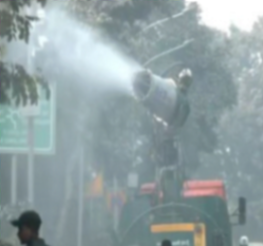
New Delhi: Amidst the rising pollution levels in Delhi, the government has instructed the administration to use truck-mount water sprinklers to mitigate the effects of air pollution.
Visuals from the Feroze Shah Roads show a truck-mounted water sprinkler spraying water on road.
Smog engulfed
A layer of smog has engulfed several parts of Delhi, but the quality of the air improved marginally.
After the air quality in the National Capital reeled into 'severe' and 'severe plus' category for the past few days, the level of air pollution slightly improved on Thursday as the air quality fell into to 'very poor' category with a thin layer of smog reducing visibility in several parts of Delhi.
Air Quality Index
According to the data of the Central Pollution Control Board (CPCB), the Air Quality Index (AQI) recorded in Delhi was 378, categorised as 'very poor', as of 11 am on Thursday.
Toxic foam continued to persist on the surface of the Yamuna River for the past several days in the Kalindi Kunj area, as the pollution level in the river continues to remain high.
Also Read |
Stubble burning cases in Punjab, Haryana despite SC's criticism
Rising pollution level
Earlier, Delhi Police directed social media and e-commerce platforms to immediately cease the online sale and delivery of firecrackers within the National Capital Territory (NCT) amid rising air pollution levels.
According to an official statement, the directive comes in a bid to protect the health and well-being of citizens directly due to increasing pollution and to prevent sale of firecrackers through e-commerce platforms.
Deteriorating air quality
The Delhi government announced that all government offices functioning under the Delhi Government and Municipal Corporation of Delhi will operate with 50 per cent of the staff strength and the remaining 50 per cent of staff will work from home in view of the deteriorating air quality in the National Capital.
Keeping in view the rising level of pollution, the Commission for Air Quality Management (CAQM) activated Stage-IV of the Graded Response Action Plan (GRAP), imposing restrictions like bans on truck entry and a halt to public construction projects.
Escalating air pollution
Earlier in the day, the Commission for Air Quality Management (CAQM) has amended the Graded Response Action Plan (GRAP), introducing stricter measures to address escalating air pollution in the National Capital Region (NCR).
According to the revisions, it will now be mandatory for NCR states to discontinue physical classes up to Class V under GRAP Stage III and up to Class XII under GRAP Stage IV. This marks a significant policy shift, removing the discretionary power previously held by state governments.
Also Read |
Jamia Millia Islamia: Clash erupts during Diwali celebration
The amended GRAP
The amended GRAP also includes a new directive under Stage III, requiring state governments to implement staggered timings for public offices and municipal bodies to reduce traffic congestion and associated emissions.
This measure reflects the commission's commitment to proactive and coordinated action against deteriorating air quality in the region.
Hazardous air quality
Under GRAP Stage IV, a "mask advisory" has been introduced, urging individuals to wear masks when stepping outdoors during periods of hazardous air quality. This addition emphasizes the importance of personal health precautions alongside institutional interventions. (with Agency inputs)







